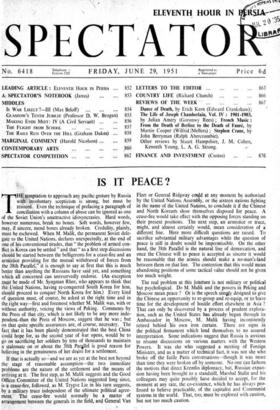IS IT PEACE?
THE temptation to approach any pacific gesture by Russia with involuntary scepticism is strong, but must be resisted. Even the technique of prefacing a paragraph of conciliation with a column of abuse can be ignored as one of the Soviet Union's unattractive idiosyncrasies. Hard words, however numerous, break no bones. Soft words, however few. may. if sincere, mend bones already broken. Credulity, plainly. must be eschewed. When M. Malik, the permanent Soviet dele- gate to the United Nations, declares unexpectedly, at the end of one of his conventional tirades, that "the problem of armed con- flict in Korea can be settled "and that "as a first step discussions should be started between the belligerents for a cease-fire and an armistice providing for the mutual withdrawal of forces from the 38th Parallel.' it is enough to say at first that this is much better than anything the Russians have said yet, and something which all concerned can unreservedly endorse. (An exception must be made of Mr. Syngman Rhee, who appears to think that the United Nations, having re-conquered South Korea for him, should proceed to conquer North Korea for hint) Every kind of question must, of course, be asked at the right time and in the right way—first and foremost whether M. Malik was, with or without authority, voicing the views of Peking. Comments by the Press of that city, which is not likely to be any more inde- pendent-than the Press of Moscow, suggest that he was ; but on that quite specific assurances are, of course, necessary. The fact that it has been plainly demonstrated that the best China Could hope for, as the second year of Giar opens, would be to go on sacrificing her soldiers by tens of thousands to maintain a stalemate on or about the 38th Parallel is good reason for believing in the genuineness of her desire for a settlement.
If that is actually so-Land we are as yet at the best not beyond the stage of reasonable assumption—the two immediate problems are the nature of the settlement and the means of arriving at it. The first step, as M. Malik suggests and the Good Offices Committee of the United Nations suggested long since, is a cease-fire, followed, as M. Trygve Lie in his turn suggests, by a military truce independent of the ultimate political agree- ment.- The cease-fire would normally be a matter of arrangement between the generals in the field, and General Van Fleet or General Ridgway cod at any moment be authorised by the United Nations Assembly, or the sixteen nations fighting in the name of the United Nations, to conclude it if the Chinese and North Korean's show themselves disposed for peace. A cease-fire would take effect with the opposing forces standing on their present positions. The next step, an armistice or truce, might, and almost certainly would, mean consideration of a different line. Here more difficult questions are raised. To sacrifice substantial militaty advantages while the question of peace is still in doubt would be impermissible. On the other hand, the 38th Parallel is the natural line of demarcation, and once the Chinese will to peace is accepted as sincere it would be reasonable that the armies should make a no-man's-land between them on that line. The contention that this would Mean abandoning positions of some tactical value should not be given too much weight.
The real problem at this juncture is not military or political but psychological. Do M. Malik and the powers in Peking and Moscow mean peace ? Or is the speech simaly designed to give the Chinese an opportunity to re-group and re-equip, or to leave time for the development of hostile effort elsewhere in Asia ? That can only be discovered by a process of prudent explora- tion, such as the United States has already begun through its Ambassador in Moscow, M. Malik having incontinently retired behind *his own iron curtain. There are signs in the political firmament which lend themselves to no assured interpretation. Some indications suggest that Russia is anxious to resume discussions on various matters with the Western Powers. It was she who suggested a meeting of Foreign Ministers, and as a matter of technical fact, it was not she who broke off the futile Paris conversations—though it was more than time they were broken off by someone. No one can fathom the motives that direct Kremlin diplomacy, but, Russian expan- sion having been brought to a standstill, Marshal Stalin and his colleagues may quite possibly have decided to accept, for the moment at any rate, the co-existence, which he has always pro- fessed to believe practicable, of the capitalist and Communist systems in the world. That, too, must be explored with caution, but not too much caution.


































